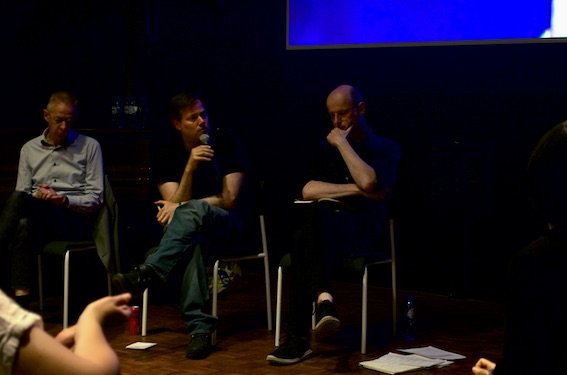Representation, method and freedom with Milo Rau
The focus area Migration & Societal Change hosted two engaging events with theatre and film director Milo Rau. He currently is the artistic director of NTGent. Rau is well-known for combining art, literature, and politics in his work and for addressing issues like forced migration, colonialism, and structural injustice.
First, there was a workshop during which three participants from different research backgrounds related their own work to the work and methods of Milo Rau, which was followed by a discussion. Later, during the evening event three presenters challenged Milo Rau’s latest production of Wilhelm Tell.
Workshop
The workshop opened at 15.30 with an in introduction of Milo Rau’s work by Susanne Knittel during which she paid particular attention to how critique is a central part in Rau’s work. The presentation by Jülide Sezer focused on the limits of representation of children on a stage with particular attention to children from Palestine. Her presentation mainly related to the controversially received play ‘Five Easy Pieces’ in which children stage the child murderer and molester Marc Dutroux. Olga Efremova followed with a presentation on “trials by ghosts” in which victims and perpetrators of traumatic experiences are portrayed on a stage. Efremova’s presentation directly touched on Milo Rau’s work of staging show trials, such as the production of ‘The Moscow Trials’. The last presentation by Johan Sonnenschein had a very personal touch and it asked the question how art can help to change the perspective on down’s syndrome. Sonnenschein’s presentation paid particular attention to Milo Rau’s production of ‘120 days of Sodom’ which was enacted by actors with down-syndrome. All conversations were moderated by Liesbeth Groot Nibbelink.
Evening Discussion
The public event in the evening addressedMilo Rau’s recent production at Schauspielhaus Zürich, an adaption from Friedrich Schiller’s Wilhelm Tell. In this production Milo Rau and his team engage with the Swiss national play by connecting some of its scenes with current day forms of oppression, resistance, and struggles for freedom.Three scholars from Utrecht University reacted directly to the play or its production. The event was moderated by Christoph Baumgartner.
The first researcher to react to Milo Rau’s production of Wilhelm Tell was Nina Köll. She used a recent documentary on the production to raise questions about how hegemonic power can be used for counter-hegemonic purposes, and what would be necessary to challenge oppressive systems to deliver systematic change. Chiel Klattenbelt used the scene of a police arrest of an immigrant and ‘den Apfelschuss’ to discuss Rau’s use of video during his theatre productions. Lastly, Dorothea Gädeke used a scene from Wilhelm Tell where the ‘heroic’ protagonist refuses to host a person that asks for his help, to raise questions about the representation of who is good and who is bad in the play. The three presentations were followed by a public discussion during which Milo Rau admitted that he wished his production of Wilhelm Tell would have be ‘less weak’ and more controversial.

Acknowledgements
We, the team of the focus area want to give special thanks to Susanne Knittel, Liesbeth Groot Nibbelink and Trudy Hekman to help us organize this event. Furthermore, a big thank you goes out to Jülide Sezer, Olga Efremova, Johan Sonnenschein, Nina Köll, Chiel Klattenbelt and Dorothea Gädeke. Moreover, we want to thank Ria Duoma for her help, and last but not least, thank you to all participants for having made it an engaging workshop and evening.

